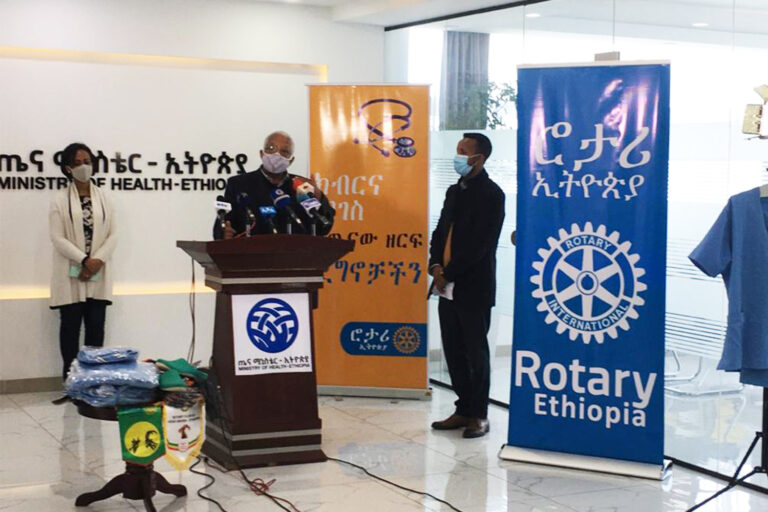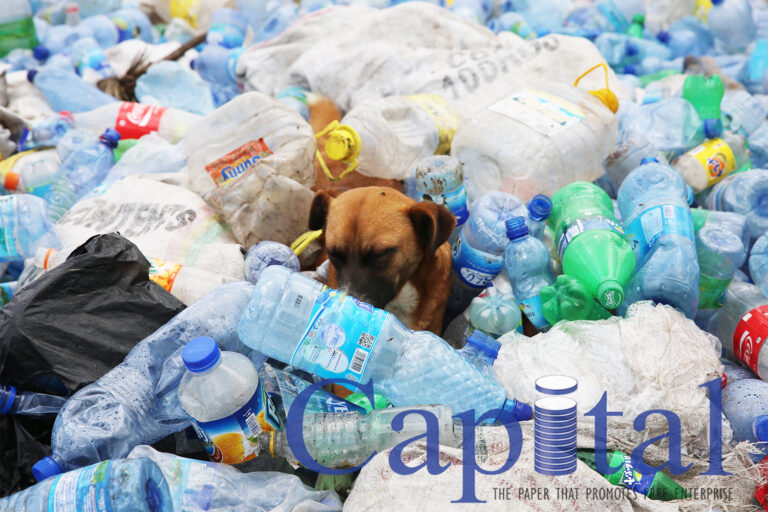+Nyala Insurance S.C (NISCO) purchased an additional bond worth 12 million Birr to help finance the construction of the Grand Ethiopian Renaissance Dam (GERD). This comes after Ethiopia announced the completion of the first phase of filling the dam.
Chief Executive Officer Nyala, Yared Molla during the ceremony held at the Ministry of Water, Irrigation and Energy, said that the company had purchased a total of 51.2 million Birr worth of bond in six rounds since the start of the construction.
“Today’s bond is the 7th round of purchase that brings the total amount of contribution so far made by our company to over 63.2 million birr, and we will continue to support our project until the end,” Yared said.
Expressing his joy over the successful completion of the first year filling of the GERD, the CEO called on all Ethiopians to continue their unreserved support to the realization of the dam as it is “the symbol of national unity and pride.”
He has also affirmed his company’s readiness to further continue supporting the construction of the dam till its completion.
Deputy Governor of National Bank of Ethiopia, Solomon Desta who attended the ceremony urged other financial institutions to take similar measures as purchase of bond is crucial to enhance the financial needs of GERD at this critical time. “Other financial institutions should follow suit of Nyala Insurance,” Solomon said.
Ethiopians have so far contributed over 13 billion birr for the dam, which is being constructed entirely with domestic funds.
NISCO is one of the leading Insurance Companies in Ethiopia in terms of performance growth and financial position.
It was established in 1995 to engage in general insurance business with a subscribed capital of 25 million birr and paid-up capital of 7 million birr. In 2005, NISCO turned into a composite insurer by adding life business and increasing its paid-up capital to 35 million birr. Currently its paid-up capital reached 416 million birr.
In 2019, NISCO wrote 492 million birr of premium income and realized a gross profit of 184 million birr. Its shareholders’ equity reached 842 million birr while its total assets reached 2.1 billion birr.
Nyala Insurance supports GERD by buying additional 12 million birr bond
Rotary Ethiopia donates PPE’s, medical supplies
Rotary Ethiopia in collaboration with the Rotary Foundation of Rotary International, William Grant and Sons Brands Ltd, Swiss Club Addis Ababa and its global networks donated six million birr worth of Personal Protective Equipment (PPE) and medical supplies to the Ministry of Health as part of its continued support to combat COVID-19 pandemic.
These contributions are mobilized by the Rotary clubs of Addis Ababa, Addis Ababa Bole, and Debre Berhan. The donations include essential PPE like scrubs, goggles, heavy-duty gloves, medical footwear, and equipment like dual-use oxygen concentrators, multi-parameter patient monitors, nasal cannula, and fingertip oximeters.
“Most of these items are purchased from manufacturers and importers in the country to support the local business to continue providing the highly needed employment opportunities to our people during these difficult times,” reads a statement from Rotary Ethiopia.
Four small and medium manufacturing enterprises and at least five trading and distributing firms which have an estimated number of 360 employees were awarded the business.
“The enormity of the challenges that must be tackled to combat the COVID-19 is requiring better organization, effective designing of our interventions, and a systemic approach to solutions, among others. The need for coordination with the target beneficiaries and national and global endeavors are of paramount importance to make deliveries relevant, quick, impactful, and sustainable,” further reads the statement sent to Capital.
“Rotary Ethiopia is determined to continue supporting our national effort in this fight against this pandemic as long as it takes. The endeavor is also part of Rotary’s long-standing commitment and dedication to serving our communities,” said Lia Tadesse (MD) Minister of Ministry of Health during the handing over ceremony.
Rotary is a non-political, non-religious, and not-for-profit worldwide network of business and professional leaders that provides humanitarian services, encourages high ethical standards in all vocations, and promotes goodwill and peace in the world under its motto of “Service above self.” It was established in 1905 and now operates in more than 220 countries organized in above 35,000 clubs with more than 1.2 million Rotarian members across the globe.
Rotary in Ethiopia has been serving the communities since 1955. Currently, there are 21 Rotary clubs in the country. These clubs have daughter Rotaract clubs with members between the age of 18 – 30 and interact clubs with members between the ages of 12 to 18. At the moment, there are 15 Rotaract clubs and 20 Interact clubs in the country. With nearly 2000 members across these groups of volunteers, the Rotary movement is expanding fast all over the country. New clubs have been established, such as the Rotary Club of Goba, in Bale zone, the Rotary club of Qarsa in Arsi Zone, the Rotary club of Asella in Arsi zone of the Oromia regional state and the Rotary Club of Lalibela in the Amhara regional state. More clubs are under formation in all the regions of the country with lofty plans for expanding volunteerism, goodwill, and high ethical standards among the youth and adults all over the country.
New report slams Africa’s Green Revolution “failing on its own terms”
Fourteen years ago, the Bill and Melinda Gates and Rockefeller foundations launched the Alliance for a Green Revolution in Africa (AGRA) with the goal of bringing Africa its own Green Revolution in agricultural productivity. Armed with high-yield commercial seeds, fertilizers and pesticides, AGRA eventually set the goal to double productivity and incomes by 2020 for 30 million small-scale farming households while reducing food insecurity by half in 20 countries.
According to a new report from a broad-based civil society alliance, based partly on new background paper, AGRA is “failing on its own terms.”
The report states that there has been no productivity surge. “Many climate-resilient, nutritious crops have been displaced by the expansion in supported crops such as maize. Even where maize production has increased, incomes and food security have scarcely improved for AGRA’s supposed beneficiaries, small-scale farming households,” the report reads.
The number of undernourished in AGRA’s 13 focus countries has increased 30% during the organization’s well-funded Green Revolution campaign, including Ethiopia.
“The results of the study are devastating for AGRA and the prophets of the Green Revolution,” says Jan Urhahn, agricultural expert at the Rosa Luxemburg Stiftung, which funded the research and published on July 10, “False Promises: The Alliance for a Green Revolution in Africa (AGRA).”
Moreover the report further states that massive investments spent promoting and subsidizing commercial seeds and agrichemicals across Africa have failed to fulfill their purpose of alleviating hunger and lifting small-scale farmers out of poverty, according to the paper.
In pursuit of its vision, AGRA has collected nearly USD 1 billion in donations and disbursed USD 524 million, primarily in 13 African countries, on programs promoting the use of commercial seeds, chemical fertilizers and pesticides. This “Green Revolution” technology package is further supported by subsidies; Wise reports that African national governments have spent roughly USD 1 billion per year in the target countries subsidizing the purchase of seeds and agrichemicals.
Despite the public support, AGRA has provided no comprehensive evaluation or reporting on its impacts.
“We find little evidence of widespread progress on any of AGRA’s goals, which is striking given the high levels of government subsidies for technology adoption,” the researchers report. The paper documents slow productivity growth, no significant increases in food security or small-farmer incomes in the target countries, and worsening hunger.
“The evidence suggests that AGRA is failing on its own terms,” the paper concludes.
AGRA said it is “very disappointed” in the research. “Over the last 14 years, AGRA has achieved its successes, but has also learned a lot,” the group said in a statement. AGRA said the Tufts paper failed to meet “basic academic and professional standards of peer review and asking the subject to comment on the ‘findings,’” and accused of having “a history of writing unfounded allegations and uncorroborated reports about AGRA and its work.”






